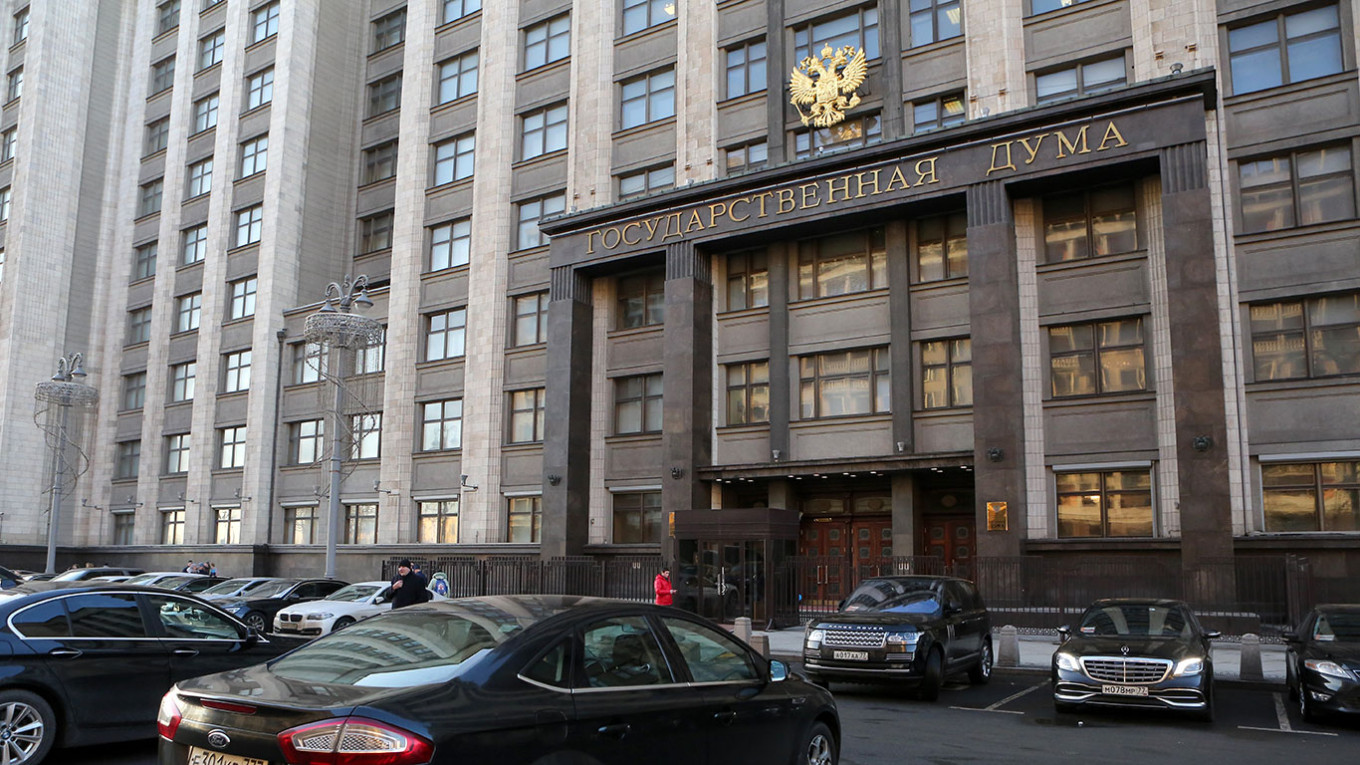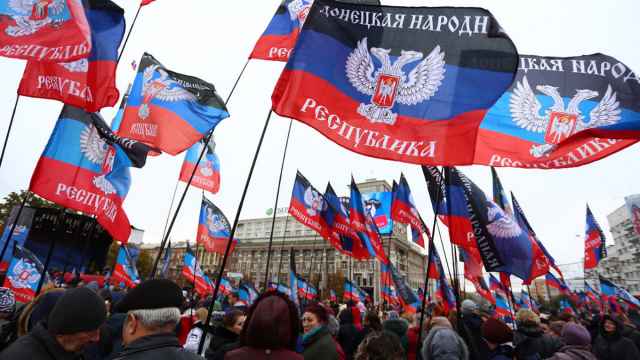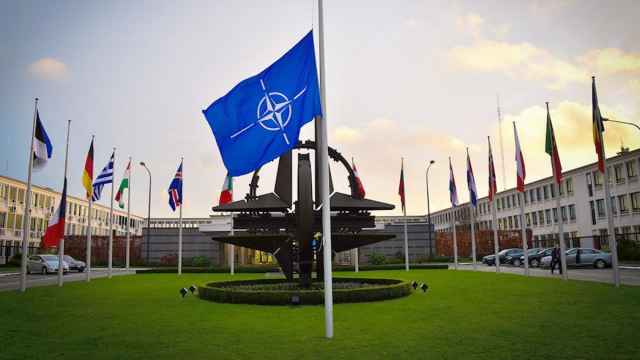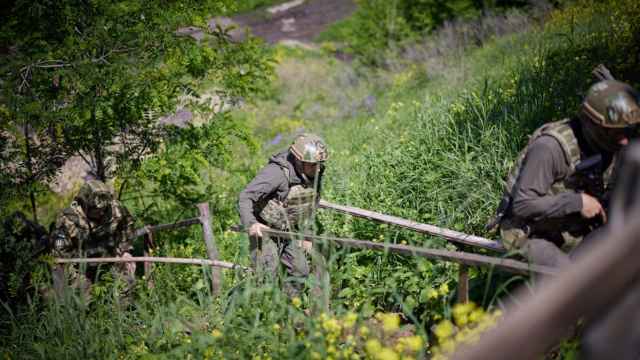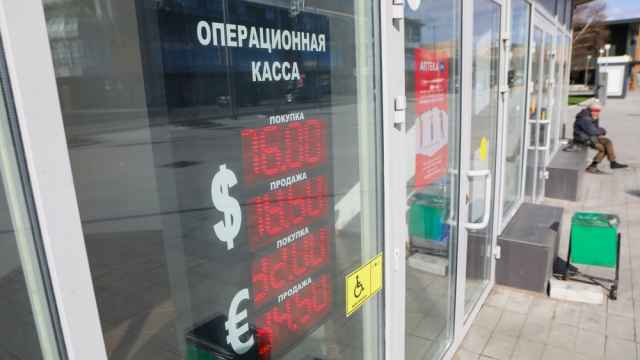Russia’s State Duma on Tuesday backed a resolution calling for diplomatic recognition of Eastern Ukraine’s pro-Russian Donbas People’s Republics, raising tensions between Russia and Ukraine another notch, even as Russian troops began a partial withdrawal from the Ukrainian border.
The Russian parliament’s motion calls for President Vladimir Putin to formally recognize the Donetsk and Luhansk People’s Republics, both of which declared independence from Ukraine in 2014. No other country currently recognizes the republics as sovereign states.
The motion, initially proposed by the Communist parliamentary opposition, attracted support from across the Duma’s five parties, including from speaker Vyacheslav Volodin.
“Firefights are continuing, people are dying,” Volodin said on the Telegram messenger app in the run-up to the vote.
“We must find a solution.”
The resolution is not binding, and will now be sent to Putin for feedback.
But although the bill’s passage is a hammer blow to the Minsk Accords, a stalled ceasefire agreement signed in 2015, experts caution that the Duma’s approval does not signify the Kremlin’s backing, or mean the bill is going any further.
“As it stands, the Duma’s resolution is primarily a propagandistic one,” said Konstantin Skorkin, a Donbas expert at the Carnegie Moscow Center think tank.
“The Minsk Agreements are much better for Russia than for Ukraine, but it’s useful for Moscow to show Kyiv that it could abandon them, if it needs to.”
Under the Minsk Agreements, the Donbas People’s Republics are to return to Ukrainian control with extensive autonomy as part of an eventual political settlement.
Russia had hoped that an autonomous Donbas within Ukraine would prevent Kyiv from moving decisively toward the West, while also bolstering pro-Russian forces in Ukrainian politics.
However, neither Ukraine nor Russia have implemented their obligations under Minsk, and negotiations on the accords have stalled.
But with diplomatic recognition amounting to Moscow’s support of Donbas independence becoming official, Russia is flirting with effectively renouncing the Minsk agreement, and with it a fragile peace process in Eastern Ukraine.
“Recognizing the Donetsk and Luhansk People’s Republics means our departure from the Minsk Agreements and the destruction of our position on the resolution of this conflict,” Konstantin Zatulin, a United Russia lawmaker who is deputy chairman of a Duma commission on relations with the former Soviet Union, told the liberal Moscow Echo radio station Tuesday.
“In that sense, [recognition] won’t benefit Russia or the republics.”
Though recognition of the Donbas has never been a mainstream position in Russian politics, it is a popular one, with influential champions including RT editor-in-chief Margarita Simonyan. An April 2021 poll by the independent Levada Center showed majority support among Russians for the Donbas becoming formally independent, or annexed by Russia.
In recent months, the Donbas’ fate has come to the fore of Russian politics.
In December, Putin spoke emotionally of the plight of the region’s Russian-speaking population, accusing Kyiv authorities of “genocide”. Last month, Andrey Tuchak, the leader of United Russia, spoke out in favor of shipping arms to the separatist authorities in Donetsk and Luhansk.
“United Russia needed to close the question of the Donbas, and stop itself from being outflanked,” said Tatiana Stanovaya, the founder of R.Politik, a political consultancy, regarding the ruling party's support for the motion.
“But this doesn’t mean other elements in the government are on side,” said Stanovaya, who believes the Russian foreign ministry is particularly opposed.
“At the end of the day, there won't be any recognition.”
The idea of recognizing the Donbas was previously seen as a potential path to escalation in the region’s conflict, and in Ukraine more widely.
Though the majority of the Donbas population lives in areas controlled by the unrecognized republics, around two thirds of the Luhansk and Donetsk regions’ territory remains under Kyiv’s effective control.
Fast-track naturalization
Diplomatic recognition by Moscow would imply recognition of the People’s Republics’ officially claimed boundaries, including areas controlled by Ukraine.
With the bulk of the Donbas population now Russian citizens under a fast-track naturalization scheme introduced by Moscow in 2019, recognition could provide Russia with a pretext for intervening more openly in the Donbas to protect its own citizens.
However, some analysts have argued that Donbas recognition is not helpful to the Kremlin at a time when Russian policy is geared towards fundamental political change in Kyiv, rather than simply securing the Donbas.
For Carnegie’s Skorkin, Donbas recognition is incompatible with Russia’s wider aim of preventing Kyiv from pursuing NATO membership. As such, the small circle of advisers around Putin responsible for Ukraine policy is unlikely to take cues from the loyalist and largely powerless Duma.
“Most likely, no one is going to recognize anything. They’ll kick it into the long grass,” said Skorkin.
It’s a view subscribed to by some Kremlin insiders.
“For now, I see this motion as part of a battle of nerves,” Konstantin Remchukov, the well-connected editor of the Nezavisimaya Gazeta newspaper told Moscow Echo radio station on Monday.
“This is about PR, about [political parties] trying to put pressure on each other,” he added.
A Message from The Moscow Times:
Dear readers,
We are facing unprecedented challenges. Russia's Prosecutor General's Office has designated The Moscow Times as an "undesirable" organization, criminalizing our work and putting our staff at risk of prosecution. This follows our earlier unjust labeling as a "foreign agent."
These actions are direct attempts to silence independent journalism in Russia. The authorities claim our work "discredits the decisions of the Russian leadership." We see things differently: we strive to provide accurate, unbiased reporting on Russia.
We, the journalists of The Moscow Times, refuse to be silenced. But to continue our work, we need your help.
Your support, no matter how small, makes a world of difference. If you can, please support us monthly starting from just $2. It's quick to set up, and every contribution makes a significant impact.
By supporting The Moscow Times, you're defending open, independent journalism in the face of repression. Thank you for standing with us.
Remind me later.



